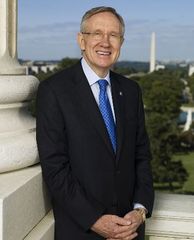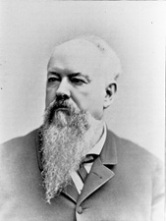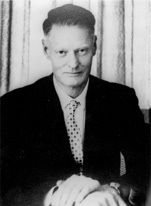Harry Reid to Retire as Nevada’s Longest-Serving US Senator by 3 Days
Reid has already passed three Nevadans in his fifth term to move into second place and will claim the all-time mark on New Year’s Day 2017

Accolades and criticisms about Reid the politician poured in after his retirement announcement, but the former member of the Capitol police force, Henderson city attorney, state assemblyman, lieutenant governor, state Gaming Commission chair, and U.S. Representative will likely add one more line to his resume before his days in D.C. are done: longest-serving U.S. Senator in Nevada history.
Reid currently sits at #2 on this list, logging in 28 years, 2 months, and 27 days of service (10,313 days) in the chamber through Sunday.
When Reid exits the U.S. Senate in January 2017, that number will rise to 30 years and one day, or 10,959 days – which will be the longest in state history by three days.

A former miner, farmer, sheriff, and state senator, Jones was the second Nevadan to hold Reid’s Class III seat when he took office in March 1873.
Jones would be reelected four times (including once as a Silver Republican for his fifth term) and serve until March 3, 1903 for a total of 30 years, or 10,956 days.
Reid will exit with 10,959 days of service – three more than Jones – although both will have served five full terms.
Here’s why: Senator Reid earned two more days than Jones due to serving in eight leap years across his five terms (1988, 1992, 1996, 2000, 2004, 2008, 2012, 2016) compared to only six for Jones (1876, 1880, 1884, 1888, 1892, 1896; there was no leap day in 1900).
Jones also lost one day to Reid as the U.S. Congress marked the start of the 43rd Congress in 1873 as March 4th – the day after the end of the 42nd Congress. Reid’s official first day in the chamber at the start of the 100th Congress in 1987 was January 3rd – also the last day of the 99th Congress.
Reid will therefore tie Jones for service on New Year’s Eve 2016 and pass him on New Year’s Day 2017.
Since winning a fifth term with his close victory against Sharron Angle in 2010 Reid has already passed three other Nevadans to jump from fifth to his current slot of second place in longest U.S. Senate service from Nevada.
Reid passed Democrat Howard Cannon (1959-1983; 8,767 days) in early January 2011, Democrat Key Pittman (1913-1940; 10,148 days) in mid-October of last year, and Republican William Stewart (1865-1875, 1887-1905; 10,313 days) on February 2nd.
Rounding out the Top 10 longest-serving Nevada U.S. Senators are Democrat Pat McCarran (1933-1954) at 7,879 days, Democrat Alan Bible (1954-1974) at 7,321 days, Democrat Francis Newlands (1903-1917) at 5,410 days, Republican Paul Laxalt (1974-1987) at 4,400 days, and Republican George Malone (1947-1959) and Democrat Dick Bryan (1989-2001) at 4,384 days.
Of these Top 10 longest-serving Nevadans, three died in office (Pittman, McCarran, Newlands), two lost reelection bids (Cannon and Malone), and six opted not to seek another term (Jones, Reid, Stewart, Bible, Laxalt, and Bryan).
The average length of service for the state’s 25 U.S. Senators has been a shade over 12 years (4,408 days), or two full terms and approximately three weeks.

Brown was appointed to the U.S. Senate on October 1, 1954 by Governor Charles Russell after the death of Democrat Pat McCarran.
Brown was the GOP nominee in the special election held that November and was trounced by Alan Bible by 16 points.
Senator Brown served until December 1st when Bible took his seat for the briefest stint in the chamber in Silver State history.
Only three other Nevada U.S. Senators logged in less than three years in the chamber:
Republican William Massey was appointed to the Senate in July 1912 by Governor Tasker Oddie after the death of George Nixon, lost the voter preference special election by 89 votes to Key Pittman, and served until late January 2013 for a total of 213 days.
Democrat Edward Carville essentially appointed himself to the U.S. Senate in July 1945 after the death of James Scrugham. Carville, in his second term as governor, resigned and was technically appointed by his successor, Vail Pittman. Carville lost his party’s nomination in 1946 and served 1 year, 5 months, 10 days (528 days).
Democrat Berkeley Bunker, former Nevada Assembly Speaker, was appointed by Governor Carville in November 1940 after the death of Key Pittman. Bunker failed to win his party’s nomination for the 1942 special election and served until that December for a total of 2 years and 10 days (740 days).
Republican Dean Heller, Reid’s delegation colleague to the 114th Congress, currently sits at #20 with 3 years, 10 months, 21 days served through Sunday since taking office in 2011.
Length of Service by Nevada U.S. Senators
|
Rank
|
Senator
|
Party
|
Served
|
Years
|
Months
|
Days
|
# Days
|
|
1
|
John Jones
|
Republican, Silver
|
1873-1903
|
30
|
0
|
0
|
10,956
|
|
2
|
Harry Reid
|
Democrat
|
1987-present*
|
28
|
2
|
27
|
10,313
|
|
3
|
William Stewart**
|
Republican
|
1865-1875; 1887-1905
|
28
|
1
|
3
|
10,257
|
|
4
|
Key Pittman
|
Democrat
|
1913-1940
|
27
|
9
|
13
|
10,148
|
|
5
|
Howard Cannon
|
Democrat
|
1959-1983
|
24
|
0
|
1
|
8,767
|
|
6
|
Pat McCarran
|
Democrat
|
1933-1954
|
21
|
6
|
25
|
7,879
|
|
7
|
Alan Bible
|
Democrat
|
1954-1974
|
20
|
0
|
16
|
7,321
|
|
8
|
Francis Newlands
|
Democrat
|
1903-1917
|
14
|
9
|
21
|
5,410
|
|
9
|
Paul Laxalt
|
Republican
|
1974-1987
|
12
|
0
|
17
|
4,400
|
|
10
|
George Malone
|
Republican
|
1947-1959
|
12
|
0
|
1
|
4,384
|
|
10
|
Dick Bryan
|
Democrat
|
1989-2001
|
12
|
0
|
1
|
4,384
|
|
12
|
Tasker Oddie
|
Republican
|
1921-1933
|
12
|
0
|
0
|
4,383
|
|
13
|
John Ensign
|
Republican
|
2001-2011
|
10
|
4
|
1
|
3,773
|
|
14
|
James Nye**
|
Republican
|
1865-1873
|
8
|
1
|
3
|
2,953
|
|
15
|
George Nixon
|
Republican
|
1905-1912
|
7
|
3
|
2
|
2,651
|
|
16
|
Chic Hecht
|
Republican
|
1983-1989
|
6
|
0
|
1
|
2,193
|
|
17
|
William Sharon
|
Republican
|
1875-1881
|
6
|
0
|
0
|
2,192
|
|
18
|
James Fair
|
Democrat
|
1881-1887
|
6
|
0
|
0
|
2,191
|
|
19
|
James Scrugham
|
Democrat
|
1942-1945
|
4
|
2
|
1
|
1,523
|
|
20
|
Dean Heller
|
Republican
|
2011-present*
|
3
|
10
|
21
|
1,421
|
|
21
|
Charles Henderson
|
Democrat
|
1918-1921
|
3
|
1
|
20
|
1,147
|
|
22
|
Berkeley Bunker
|
Democrat
|
1940-1942
|
2
|
0
|
10
|
740
|
|
23
|
Edward Carville
|
Democrat
|
1945-1947
|
1
|
5
|
10
|
528
|
|
24
|
William Massey
|
Republican
|
1912-1913
|
0
|
6
|
29
|
213
|
|
25
|
Ernest Brown
|
Republican
|
1954-1954
|
0
|
2
|
1
|
62
|
* Through March 29, 2015. ** Though elected in 1864 when Nevada achieved statehood, Stewart and Nye were not sworn into office until February 1, 1865. Table compiled by Smart Politics.
Follow Smart Politics on Twitter.

1. Had Reid edged out fellow lieutenant governor Paul Laxalt in 1974 he might well have been drowned out in the R tidal wave of 1980 – making him the only Silver State Democrat directly elected to a full term and then lose the next election (a la Republicans Mayer Jacob Hecht and Dean Arthur Heller), and, well, be pretty much forgotten by now.
2. Barring, say, appointments to the federal “Ninth Circuit” or primary defeats, current senators Cortez Masto and Rosen seem poised to serve at least two full terms, given its tradition of re-electing D senators (even scandal-tarnished Howard Walter Cannon nearly won in 1982) and trend towards the Democrats (just about any D nominee is more likely than not to win the only regularly-scheduled partisan statewide election, with its small but potentially determinative 6 electoral votes at stake).